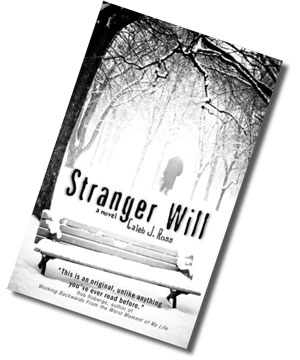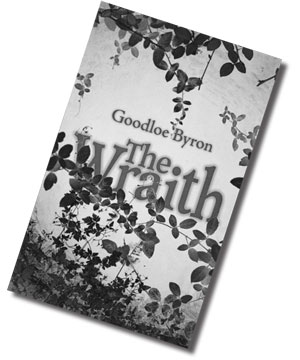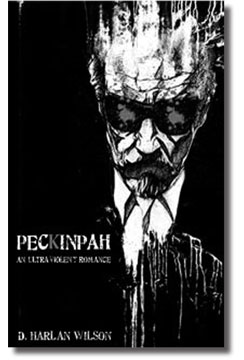Six investigations of the act of reading
By Pablo D'stair
 |
|
Caleb J Ross--Stranger
Will |
The aim of this series or six essays is not to bring a specific
understanding or criticism to the individual novel or collection each is
filtered through-indeed, the opposite could be said to be true. These
are personal, individual investigations of the act of reading, the
specific pieces serving as filter, grounding of sort.
***
I chose six works that I personally consider exemplary of aspects of
the contemporary American Indie scene, a bourgeoning scene that I do not
feel has established any specific boundaries-though not for lack of
trying, such trying I think symptomatic of a peculiar illness afflicting
new American literature but an illness I will only touch on incidentally
in this series, not one I have a desire to take stabs at making explicit
or suggesting cures for.
It is because of this unformed nature that
works I feel bound in it are a perfect fit for such investigations as
mine-with no crutch of general, unconsciously felt consensus or
canonized, documented, argued specifics to lean on, these works are
approached by me (and I would say by anyone) in a kind of ether-my
reactions are delineated only by the very fact that I read them, how I
read them, when I read them, where I read them. I could have chosen six
others, I could have chosen six more-the works themselves are presented
due to no specific allure beyond that I encountered them and feel they
have wormed a place out in me, to whatever end
***
Though I will at times refer to specific scenes or aspects of these
works, I will in no way make any effort to give summary of their plots,
critique of their themes, or define their "natures"-indeed, one of my
personal beliefs is that not sufficient enough time has passed since my
reading of these books to allow me to honestly say I have an opinion of
them, only that I had a reaction and this reaction has continued past
the direct contact with the works.
 |
|
Goodloe
Byron--The Wraith |
And though I at times will make
direct reference to my remembered and my dwelled upon thought processes
and personal feelings with regard to the material, I am in no way
recommending for or against the reading of any-I believe there is an
inherent value in the act of reading, the quality of the content
irrelevant and so immaterial to these investigations.
***
Not to jump in entirely without context, though, I do want to briefly
riff on some of the general lenses I read through, go over, so to speak,
my "act in abstract" so that it is clearly understood I am not seeking
to say anything Universal on the subject of reading, that I do not think
there is anything universal except for the fact that the act must to
each person be explicitly individual.
I feel opinion of a piece of literature is quite without value or
relevance-if I read Saramago, Michaels, Topor, Chesterton it matters
little if I have a fine or a low opinion of it, what matters is my being
cognizant of my experience reading, my felt reaction to the thoughts I
experienced, whether they touch on this or that novel in particular or
no.
"What happened to me?" while I read X or Y, "What did the reading do
and how did I interface or resist-what did I do while I read?"
Each essay will have a specific slant, I will bring out specifics
with regard to things I think about most everything I read and even
"reading in abstract", so I do not want undo emphasis to be placed on
the filters, do not want to suggest "this is the primary thing" I
thought about while reading the work in particular or even "this is the
most interesting thing" I thought about with regard to the piece.
By
this I mean to reiterate that the series is overall a whole-a single
investigation of Act-and do not offer the subject of each essay as a
suggested guide or codex for the works, in fact I would strongly
recommend to anyone who reads the works I mention to do their very best
to shut themselves of whatever I say (as far as such a thing is
possible) and to approach them without the tethers of any specific
referent.
***
 |
|
Harlan
Wilson--Peckinpah |
In the order of the series, the authors and works I will be using, as
well as the slant to each investigation, are as follow-Stephen Graham
Jones, the Bird is Gone: a manifesto (Context); Caleb J. Ross, Stranger
Will (Genre); Goodloe Byron, The Wraith (Subtext); Amelia Gray, AM/PM
(Type); D. Harlan Wilson Peckinpah: an ultraviolent romance (Referent);
Brian Olu, So You Know It's Me (Framing). While familiarity with the
works has no bearing on what I investigate in the series, it also
couldn't hurt-various excerpts, reactions, discussions can be found
regarding all of these titles may places online. Additionally, I welcome
any and all contact with regard to this series and will respond to all
correspondence. I can be reach through [email protected].
***
It is my sincere hope that this series will both be somewhat
intriguing toward a further delving into the contemporary American Indie
scene, and (moreso) that it will encourage a particular
self-consciousness to reading which I believe is to be valued above all
else, whether reading is done for leisure, study, or is merely dabbed
at, incidentally.
|

